Looking for love, King Lear and IDP theatre at the Travelling Docudays UA in Lviv
Looking for love, King Lear and IDP theatre at the Travelling Docudays UA in Lviv
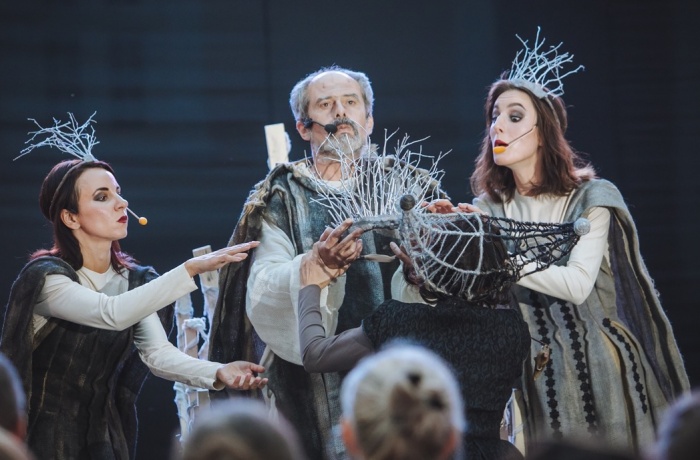
King Lear: How We Looked for Love During the War is a documentary by Dmytro Hreshko about a theatre company of internally displaced people in Uzhgorod, their volunteer work, and their play King Lear. It is a film about people who are restarting their lives from scratch and looking for their purpose in a city far away from their homes, who come together and help others.
The film tells the stories of IDPs who left their homes at the beginning of the full-scale invasion and took a train into the unknown, with Uzhgorod as the final destination. Now they—engineers, artists, teachers—volunteer together, cook food for other IDPs, make masking nets, and launch civil initiatives.
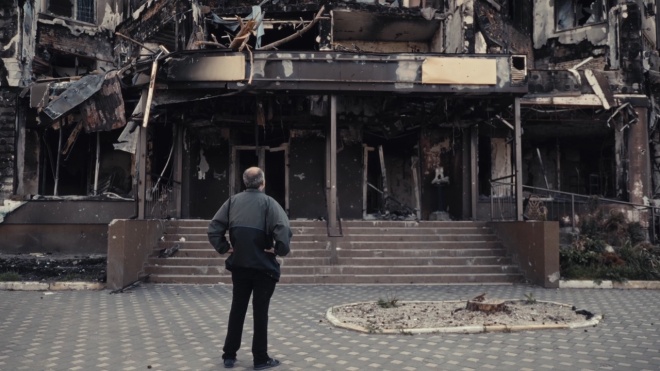
Photo: a still from King Lear: How We Looked for Love During the War.
Vyacheslav Yehorov, a director and activist from Uzhhorod who decided to stage Shakespeare’s King Lear, also participates in the volunteering together with his wife. Vyacheslav had long had a dream about theatre, and finally he staged King Lear by Shakespeare, a play which became his graduation project.
The stage director did not want to hire professional actors, because displaced people who have experienced so much hardship are the most prepared to say from the stage what it means to look for love and for your purpose, and to create your new future on your own. That is why Vyacheslav Yehorov gathered Ukrainians who had evacuated to Uzhhorod from the East and South of Ukraine. Together with them, he tried to find answers to questions about what love during the war is, how to keep your humanity in situations of crisis, and why, despite all the horrors, the world should not die.
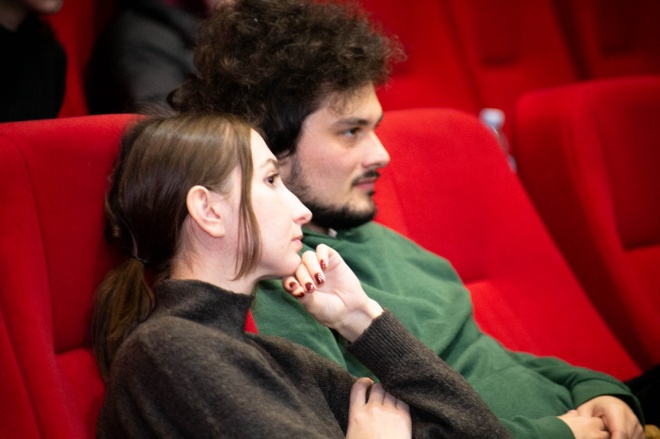
Audience members at the 20th Travelling Docudays UA in Lviv
The film screening was organised in collaboration with the Lviv Film Commission and the Lviv Film Centre as a part of the Ukrainian Cinema Days. The subject of this year’s Travelling Docudays UA is the Image of the Future.
“The image of the future is about what kind of country we want to become and what kind of a rights-based state we want to build, and about what we need to keep our humanity here and now, how to help one another. It is about love, friendship, and mutual support, and about faith in the higher ideals,” says Nina Khoma, Docudays UA coordinator in the Lviv Region.
The small hall of the Lviv Film Centre. The first scene shows the lead actor of the play, King Lear, slowly passing the ruins of his school in Irpin where he used to be a teacher. He examines his kingdom, littered with glass shards and the bones of steel reinforcements that stick out from concrete, and then he recalls: “I could even fall asleep to the sounds of anti-aircraft guns.”
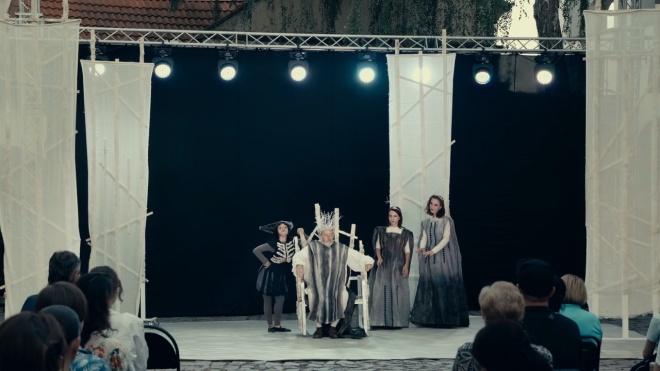
Photo: a still from King Lear: How We Looked for Love During the War.
Uzhhorod. Embankment. Two displaced actresses are on a walk, feeding ducks. An air raid siren wails. “Can you imagine,” says one actress to the other, “It’s soon going to be three months, 90 days.”
“A person has no chance to live without love. When they lose a feeling such as love, they become doomed. Nothing new can be born. So I think that this reading of Shakespeare will be relevant. The stage play has no other storylines, because we will be talking about the most important thing: about love,” says Vyacheslav Yehorov.
The director says that all the actors have very different personalities, backgrounds, but despite this, the team staged a play which resonates with society’s experiences of the war.
“These people, just like the King, have lost love and are now looking for it. But they haven’t lost the most important thing: humanity. And love is what is needed to move on,” emphasises Vyacheslav Yehorov.
The film premiered in Los Angeles, and it is now being demonstrated on the screens of the Travelling Docudays UA 2023. The stage director visited the film screening and spoke about the processes of staging the play and making the film.
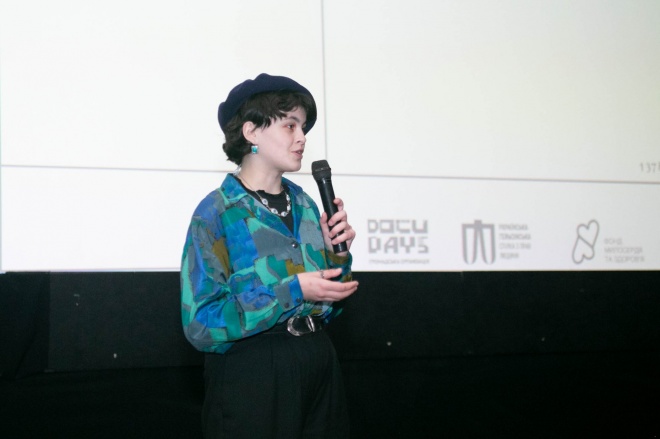
20th Travelling Docudays UA in Lviv
One of the central questions raised by the film director Dmytro Hreshko and the stage director Vyacheslav Yehorov is the need for the presence of art in people’s lives even during the war. Should we invest effort and time in creativity? Or should we only focus on helping the Army to defend our Homeland? This question was extremely relevant at the beginning of the full-scale invasion, but it continues to provoke discussion even today: in what ways should we create art? What is its role in our identity and victory?
“We know how to make bread, and we consume it, but do we need art every day? If we don’t make Ukrainian cultural products, what will a regular Ukrainian consume? What products and whose products? What will our cultural code be?”, addressed the audience Vyacheslav Yehorov. There were also difficult moments during the staging. Two actors abandoned the play, so King Lear was on the brink of failure. The actors and the director experienced moments of crisis — what saved them was a trip to the mountains. “We had a rehearsal there, and after that the actors and I had no doubts anymore. It is impossible to explain everything with logic, direct senses, to tell yourself “you just need to do it,” people need mental rebooting during periods of intense work,” says Vyacheslav.
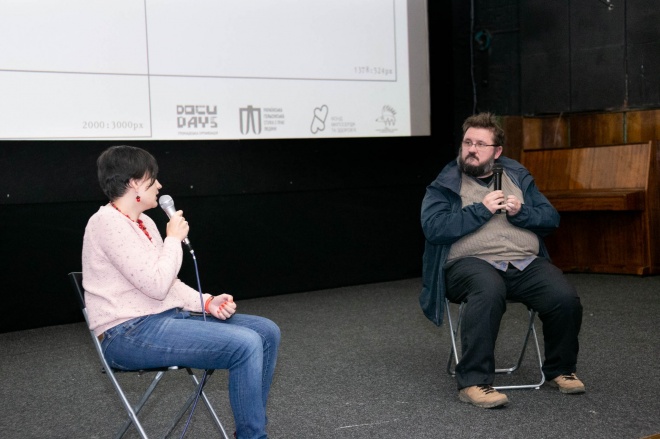
20th Travelling Docudays UA in Lviv
The director adds that the play was also important for the audience, and even more so for the actors, it was important for them to feel… almost like demiurges, to dominate the chaos of events, to feel what you’re worth and how you’re perceived. A full house and applause — against the background of war.
In the end, all the actors stayed in Ukraine, even though they had doubts. Some continue to work with the theatre, some have come back home. But all of them, just like us on the other side of the stage and the screen, continue to look for and rethink our purpose and, despite difficult challenges, reaffirm the powerful force of love.
Author: Kateryna Bortniak.
Header photo: a still from King Lear: How We Looked for Love During the War.
The 20th Travelling Docudays UA is supported by the Embassy of Sweden in Ukraine, the Embassy of Switzerland in Ukraine, and the US Embassy in Ukraine. Opinions, conclusions, or recommendations do not necessarily reflect the views of the governments, charities, or companies of these countries. The content of this publication is the sole responsibility of its authors












